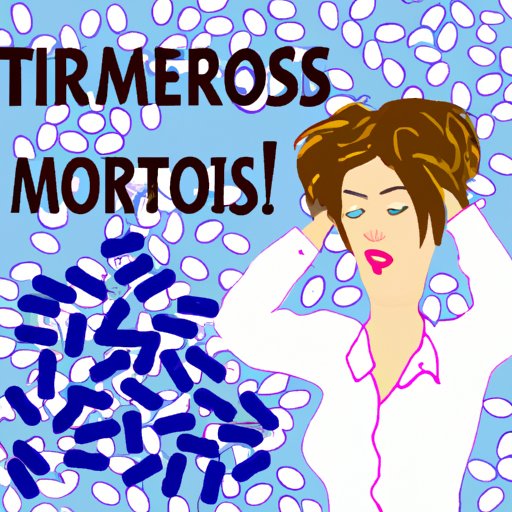Introduction
Menopause is a natural process that all women experience as they reach middle age. It is marked by a decrease in the production of hormones such as estrogen and progesterone, which leads to physical and emotional changes. Common symptoms of menopause include hot flashes, night sweats, mood swings, and fatigue. Hair loss is another common symptom of menopause, though it is often overlooked or dismissed.
Hair loss can be an emotionally distressing experience for anyone, but it can be particularly difficult for women who are already dealing with the other symptoms of menopause. Understanding the link between menopause and hair loss can help women better manage the condition.

Examining the Link between Menopause and Hair Loss
The primary cause of hair loss during menopause is hormonal changes. Estrogen helps keep hair follicles healthy, so when levels of estrogen drop during menopause, the hair follicles become weaker and more prone to shedding. This type of hair loss is known as “telogen effluvium” and usually begins around the time of menopause.
Genetics also play a role in menopausal hair loss. If you have a family history of hair loss, you may be more likely to experience hair loss during menopause. Additionally, some medications used to treat menopausal symptoms, such as hormone replacement therapy (HRT), can contribute to hair loss.

Investigating the Causes of Hair Loss During Menopause
In addition to hormonal changes and genetics, there are several other factors that can contribute to hair loss during menopause. Thyroid problems, such as hypothyroidism, can lead to hair loss, as can stress, poor diet, and certain medications.
Thyroid problems can be caused by a number of factors, including genetics, autoimmune diseases, and certain medications. If you suspect you have a thyroid problem, it is important to see your doctor for testing and treatment.
Stress can also play a role in hair loss, as can diet. A diet low in essential vitamins and minerals can contribute to hair loss, as can crash diets, yo-yo dieting, and eating disorders. It is important to eat a balanced diet and get enough rest to reduce the risk of hair loss.
Certain medications, including chemotherapy drugs, blood thinners, and medications used to treat high blood pressure, can also lead to hair loss. If you are taking any of these medications, it is important to talk to your doctor about potential side effects.

Treating Hair Loss After Menopause
If you are experiencing hair loss due to menopause, there are several medical treatments available. Minoxidil is an over-the-counter treatment that can help stimulate hair growth, as can prescription medications such as finasteride and spironolactone. Laser therapy is also an option for treating hair loss, as is scalp micropigmentation.
In addition to medical treatments, there are a number of natural remedies that can help prevent or reduce hair loss. Eating foods rich in essential vitamins and minerals, such as lean proteins, fruits, and vegetables, can help promote healthy hair growth. Herbal supplements, such as saw palmetto, can also be beneficial, as can scalp massages and acupuncture.
Managing Hair Loss During Menopause
In addition to treatments, there are a few lifestyle changes you can make to help manage your hair loss. Wearing a hat or scarf to protect your scalp from sun damage can help prevent further hair loss, as can avoiding harsh chemicals and heat styling. Additionally, reducing stress through activities such as yoga and meditation can help keep your hair healthy.
A healthy diet is also important for managing hair loss during menopause. Eating foods high in protein, iron, zinc, and vitamin B can help promote healthy hair growth. Supplements such as biotin and collagen can also be beneficial. It is also important to drink plenty of water to keep your hair hydrated.
Conclusion
Hair loss is a common symptom of menopause, and it can be a difficult and emotionally distressing experience. Understanding the link between menopause and hair loss can help women better manage the condition. Medical treatments and natural remedies can help reduce hair loss, while lifestyle changes and a healthy diet can help keep hair healthy and strong.
Key takeaways: Menopause can cause hair loss due to hormonal changes, genetics, thyroid problems, stress, diet, and medication. Treatments such as minoxidil, laser therapy, and scalp micropigmentation can help reduce hair loss. Additionally, lifestyle changes such as wearing a hat or scarf, reducing stress, and eating a healthy diet can help manage hair loss during menopause.


